Tag: affordable dental implants

Smoking and Dental Implants: Can You Have Both?
May 3, 2024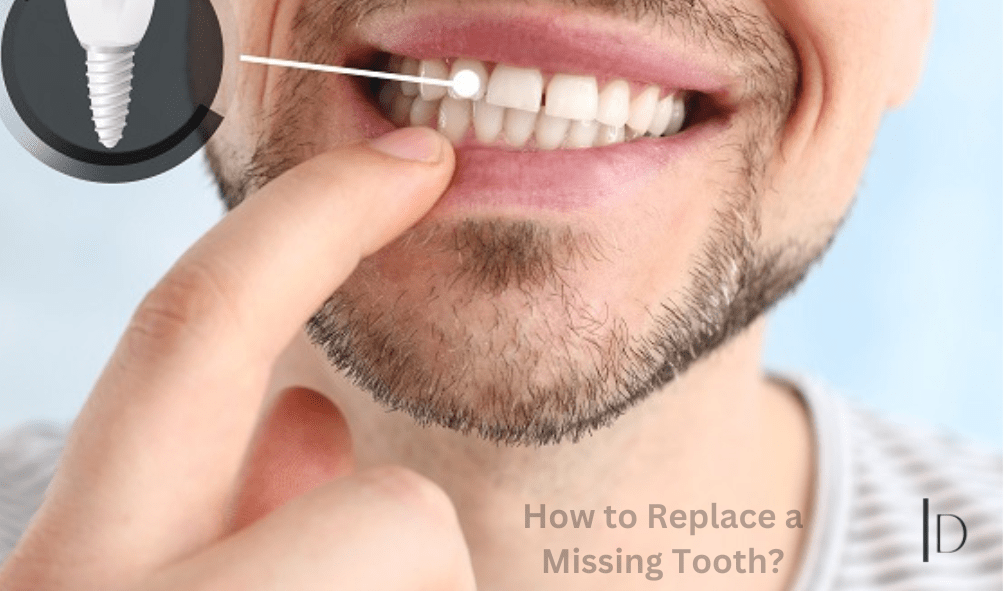
How to Replace a Missing Tooth | Affordable Smile Restoration
April 9, 2024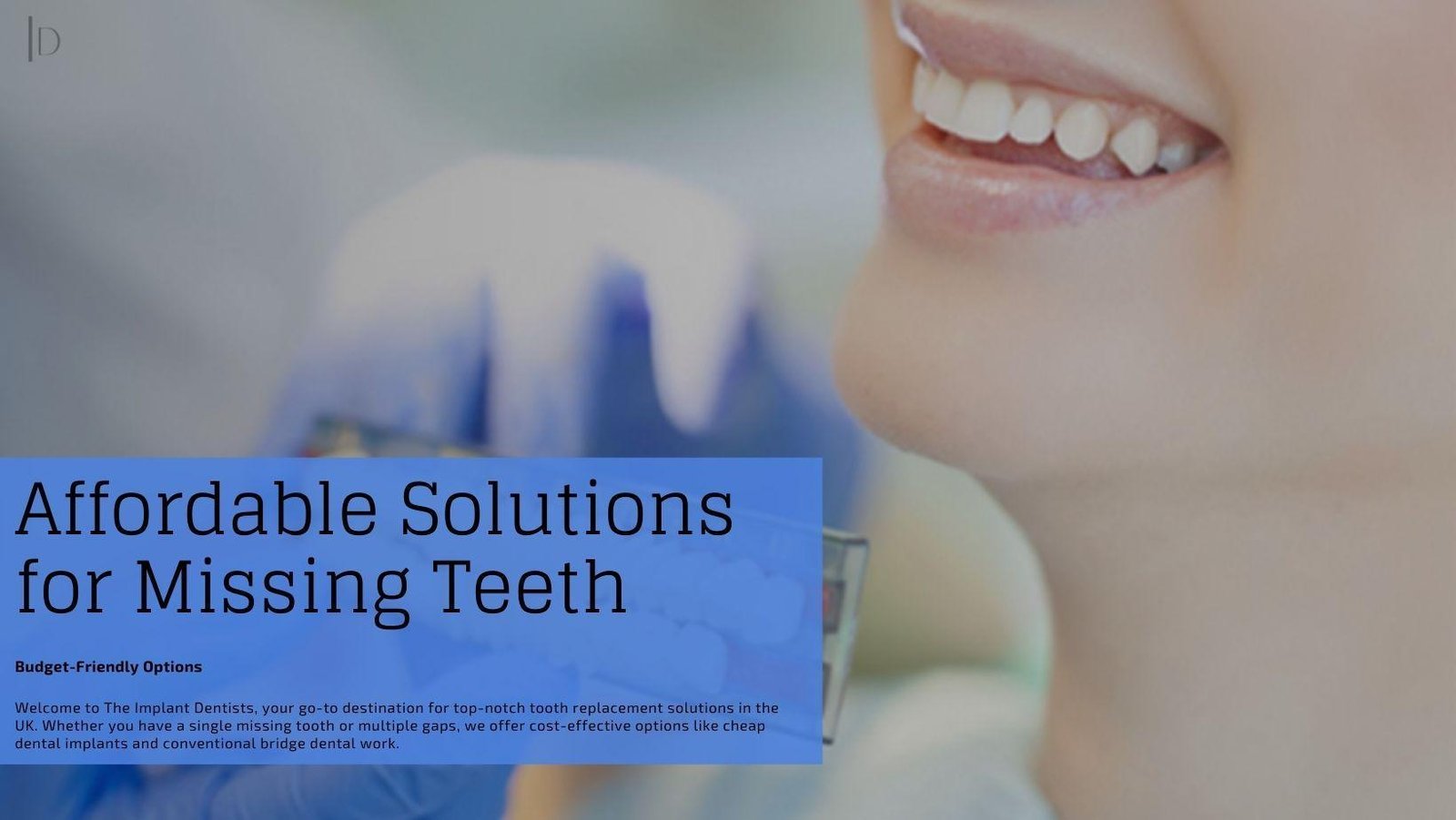
Affordable Solutions for Missing Teeth: Exploring Budget-Friendly Options
March 27, 2024Missing teeth, restoring your smile should not come with a big price tag. We understand the importance of providing affordable solutions that allow you to regain your confidence and oral health without financial pressure. Explore a variety of budget friendly options for replacing missing teeth, from traditional dentures to innovative dental implants, we will help you discover affordable solutions tailored to your needs. Say goodbye to gaps in your smile and hello to a brighter, more confident you with our affordable tooth replacement options.
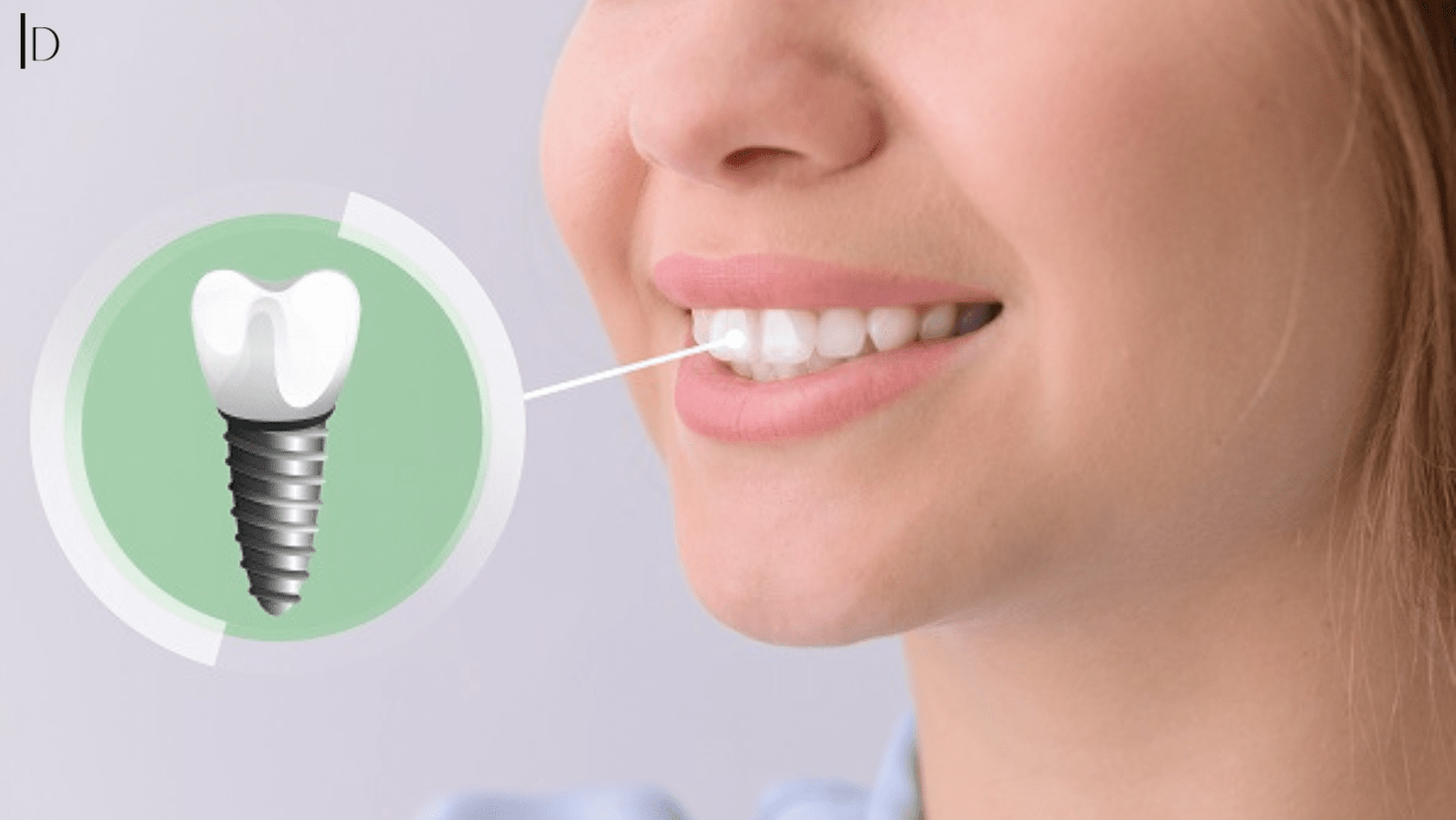
The Latest Advances in Tooth Implants: UK Perspectives
March 21, 2024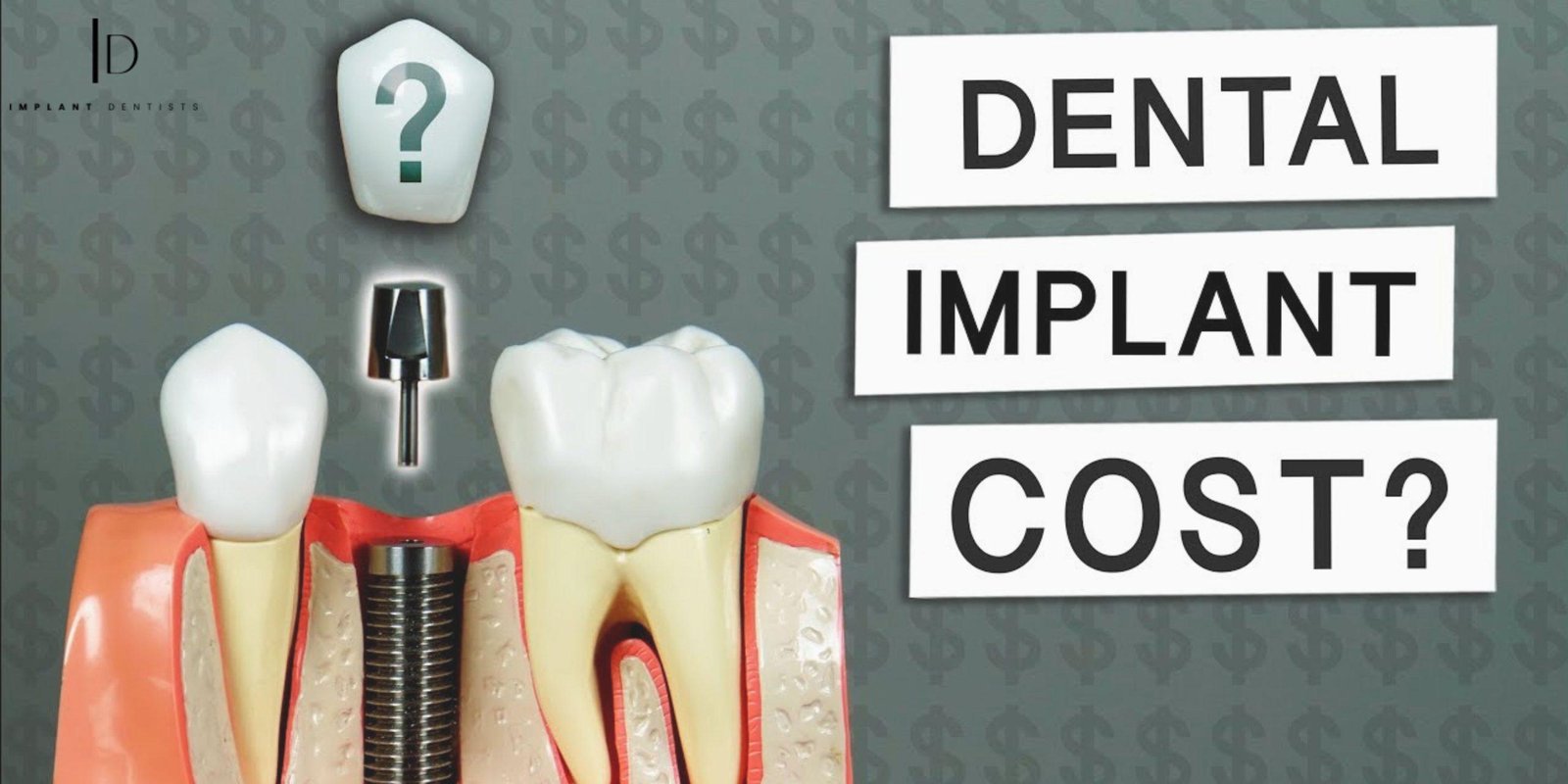
What Factors Influence the Cost of Dental Implants?
March 13, 2024Dreaming of a flawless smile with permanent replacements for missing teeth? Dental implants are a fantastic option, offering both aesthetics and functionality. But before you embark on this exciting journey, understanding the cost factors involved is crucial.
While there’s no single price tag, several key elements significantly influence the final bill. Let’s delve deeper into the main ones:
1. Number and Location of Implants
This plays a major role. Replacing a single tooth is naturally less expensive than a full arch of implants. Additionally, front teeth often require more sophisticated implants due to their high visibility. These factors contribute to a higher price tag for implants in these areas. Additionally, the location of the missing teeth within the mouth can influence the pricing. For instance, front teeth, which are more visible when smiling, talking, or eating, often require more sophisticated implants to achieve optimal aesthetics. These implants may need to be customized in shape, size, and color to seamlessly blend with the natural teeth surrounding them.
2. Complexity of the Procedure
Not all implant placements are created equal. Simple, straightforward cases will have a lower cost compared to situations requiring additional procedures. Bone grafting, for example, might be necessary to strengthen the jawbone before implant insertion. This adds to the overall treatment complexity and cost. Bone grafting involves transplanting bone tissue from elsewhere in the body or using synthetic materials to augment the jawbone. This additional step not only increases the complexity of the treatment but also incurs extra costs for the materials, surgical procedures, and extended recovery time.
3. Material Selection
Both the implant post itself and the restoration (crown, bridge, etc.) come in varying material options. Premium materials known for their durability and aesthetics typically cost more. Discuss these options with your dentist to find the best balance between cost and your desired outcome. However, patients may also have the option of choosing zirconia implants, which are known for their natural appearance and compatibility with those who have metal sensitivities. While titanium implants tend to be more cost-effective, zirconia implants often come with a higher price tag due to their advanced manufacturing process and aesthetic qualities.
4. Geographic Location
Dental costs, like many other services, can vary depending on your location. Urban areas with a higher cost of living often have pricier dental procedures compared to rural areas. In urban centers, where overhead costs such as rent, utilities, and staff salaries are typically higher, dental practices may need to adjust their pricing to cover these expenses. Additionally, urban areas tend to have a higher concentration of specialized dental professionals and state-of-the-art facilities, which can also contribute to higher costs.
5. Dentist’s Expertise and Experience
A skilled and experienced dentist with a proven track record in implant dentistry may command a higher fee. However, their expertise can ensure a smooth procedure, successful long-term results, and potentially save you money by avoiding complications down the line. Dentists who specialize in implant dentistry have undergone extensive training and accumulated years of experience in performing implant procedures. They possess a deep understanding of the complexities involved in dental implant placement, including assessing bone density, determining optimal implant placement, and ensuring proper integration with surrounding tissues.
Managing the Cost of Dental Implants
While the initial investment in dental implants can seem significant, consider it a long-term solution for a healthy, beautiful smile. Here are some tips to manage the cost:
- Consult with your dentist: Discuss your specific needs and get a personalized cost estimate. Every patient’s dental implant journey is unique, and your individual needs will play a significant role in determining the overall cost of treatment. During your initial consultation with your dentist or oral surgeon, you’ll have the opportunity to discuss your dental health goals, concerns, and any specific preferences you may have regarding the type of implants or treatment options.
- Explore insurance coverage: While coverage for implants varies, some dental plans may offer partial reimbursement. This is because dental insurance plans often categorize dental implants as a cosmetic or elective treatment rather than a medically necessary procedure. However, some dental insurance plans may offer partial reimbursement or coverage for certain aspects of the dental implant treatment, such as the initial consultation, diagnostic imaging, or any necessary adjunctive procedures like bone grafting
- Financing options: Many dental practices offer flexible payment plans to make this investment more manageable. They often provide flexible payment plans. These payment plans allow patients to spread out the cost of treatment over time, breaking it down into smaller, more affordable monthly installments. Flexible payment plans typically involve arranging a payment schedule with the dental practice, allowing patients to pay for their dental implants gradually rather than in one lump sum.
Conclusion
Remember, a healthy discussion with your dentist is key to navigating the cost of dental implants. They can provide a clear picture of the factors at play and help you find a solution that fits your budget and smile goals. Your dentist will conduct a comprehensive evaluation of your oral health, including the number of teeth to be replaced, the condition of your jawbone, and any additional procedures that may be necessary. They will take the time to explain the different types of dental implants available, along with their respective costs and benefits.
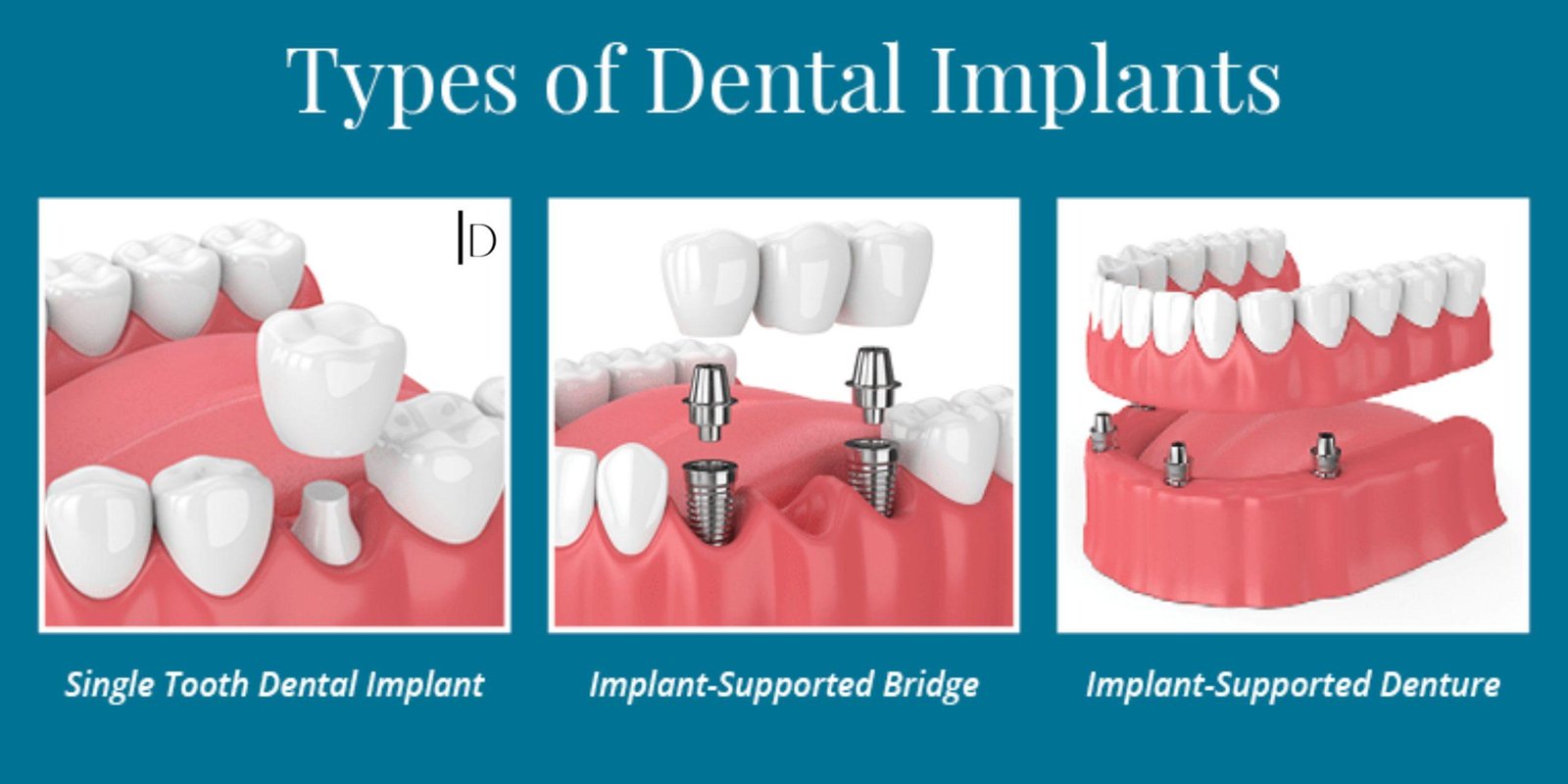
6 Dental Implant Options for Replacing Missing Teeth
March 5, 2024Maintaining optimal dental health is crucial for a lot of reasons. Beyond just showcasing a brilliant smile, healthy teeth contribute significantly to overall well-being. Research in the UK highlights the profound impact dental issues can have on daily life. The absence of a single tooth can severely hinder basic functions. Chewing and speaking can become challenging without a tooth. The loss of a tooth can make routine tasks difficult. Furthermore, untreated dental problems can escalate, leading to more serious health complications. Therefore, prioritizing broken tooth replacement not only enhances aesthetic appeal but also ensures sustained physical health and functionality.
Options available for those who have missing teeth Dental Implants
- Single Tooth Implant: Place an implant screw in the jawbone. Single Tooth Implant: Top the implant screw with a custom-made crown to replace a missing tooth.
- Implant-Supported Bridge: Replace multiple missing teeth in a row with top tooth replacement options available in the UK. Explore dental implant treatments tailored to your needs for a confident smile. Book your consultation today. An implant-supported bridge is an option. Dental professionals place dental implants at either end of the gap to provide stability and support for implant-supported bridges. They support a prosthetic bridge. 5. The prosthetic bridge spans the space.
- Implant-Supported Dentures: Traditional dentures can be secured in place with the help of dental implants. Implant-supported dentures offer increased stability and prevent issues such as slippage or discomfort commonly associated with removable dentures. Depending on the patient’s preference, they can either fix them or make them removable.
- Same-Day Teeth: Some patients can receive dental implants. With advancements in technology and techniques, these patients can have temporary crowns or bridges attached on the same day. This allows for immediate restoration of function and aesthetics.
- All-on-4 Implants: This innovative technique allows for the replacement of an entire arch of teeth using just four strategically placed implants, providing a stable foundation for a full set of prosthetic teeth.
- Guided Implant Surgery: By utilizing computer-guided technology, we carefully plan and execute implant placement with precision, resulting in optimal outcomes in terms of implant position, stability, and aesthetics.
Importance of Dental implants
Dental implants play a crucial role in modern dentistry, offering several important benefits for individuals who have lost one or more teeth. Here are some key aspects highlighting the importance of dental implants:
- Restoration of Functionality: Dental implants are designed to function like natural teeth. They provide a stable and durable foundation for artificial teeth, allowing individuals to eat, speak, and chew with confidence and comfort.
- Preservation of Jaw Bone: When a tooth is lost, the underlying jaw bone can start to deteriorate over time due to lack of stimulation. Dental implants act as artificial tooth roots, stimulating the jaw bone and preventing bone loss.
- Aesthetic Improvement: Dental implants provide a natural and aesthetically pleasing appearance. The tooth replacement teeth are custom-made to match the color, shape, and alignment of existing teeth, resulting in a seamless and attractive smile.
- Long-Term Durability: Dental implants are known for their durability and longevity. Proper care can help implants last for many years. With the right maintenance, they can last a lifetime.
- Improved Oral Health: Unlike traditional bridges, dental implants do not rely on neighboring teeth for support. This preservation of overall tooth health means that adjacent natural teeth do not compromise or alter to accommodate the implant.
- Enhanced Comfort: Dental implants eliminate the discomfort and inconvenience associated with removable dentures. Implants securely anchor in the jaw, eliminating the risk of them slipping or causing irritation to the gums.
Conclusion
In conclusion, the availability of various dental implant options allows for personalized treatment plans tailored to the unique needs and preferences of each patient. Whether a single tooth replacement or an entire arch, dental implants offer a reliable, long-term solution for restoring functionality, aesthetics, and oral health. Consulting with a qualified dental professional can help determine the most suitable implant option based on individual circumstances.

Bridge to Confidence | Exploring Bridge Tooth Implants and Replacement Teeth
February 29, 2024Losing a tooth can be an unsettling experience, impacting not only your smile but also your confidence and oral health. Fortunately, advancements in dental technology have introduced various solutions to restore missing teeth, including bridge tooth implants and replacement teeth. We’ll explore everything you need to know about these options, from their benefits to the procedure and aftercare.
What are Bridge Tooth Implants and Replacement Teeth?
Bridge tooth implants and replacement teeth are advanced artificial solutions carefully crafted to seamlessly integrate into your smile. To join advanced dental technology with precision craftsmanship, these innovations fill the gaps left by missing teeth. They renew your confidence and oral well-being in the process. Engineered for durability and comfort, they provide a permanent fix that harmonizes with your natural teeth. This ensures seamless functionality and a radiant smile for years to come.
Bridge Tooth Implants
These bridges are constructed from high-quality materials, such as porcelain, ceramic, or resilient metal alloys. They offer exceptional strength and durability. The materials used in these bridges are not only strong but also carefully chosen. They harmonize with the surrounding teeth, ensuring a seamless blend within your smile.
Replacement Teeth
Replacement teeth border a diverse array of solutions tailored to various dental needs. Dentures are one of the most common options for replacing multiple missing teeth. They are removable prosthetic devices that provide functional and aesthetic restoration. Dentures come in two forms, full dentures for entire arches of missing teeth, and partial dentures designed to fill gaps caused by the absence of one or more teeth in specific areas of the mouth.
Dental implants stand out as a remarkable advancement in dental technology. These implants serve as artificial tooth roots surgically implanted into the jawbone. They offer a robust foundation for replacement teeth, whether it’s a single tooth or multiple teeth. Dental implants provide a permanent and stable solution, mimicking the natural tooth structure and function with exceptional durability and longevity.
Benefits of Bridge Tooth Implants and Replacement Teeth
- Restored Functionality: Bridge tooth implants and replacement teeth enable you to chew, speak, and bite properly, restoring full functionality to your mouth.
- Improved Aesthetics: These prosthetic solutions replicate the appearance of natural teeth, enhancing the aesthetics of your smile and boosting self-confidence.
- Prevents Dental Issues: Replacing missing teeth helps prevent dental problems such as shifting of adjacent teeth, bone loss, and temporomandibular joint disorders.
- Long-Term Solution: Bridge tooth implants and replacement teeth are durable and long-lasting, providing a reliable solution for missing teeth that can last for many years with proper care.
- Preserves Facial Structure: Dental implants help preserve bone density in the jaw, preventing the deterioration of facial structure associated with tooth loss.
Procedure for Bridge Tooth Implants and Replacement Teeth
- Consultation: The process begins with a consultation with your dentist or prosthodontist to assess your oral health and discuss treatment options.
- Treatment Planning: We develop a personalized treatment plan for you, taking into account your specific needs and preferences, considering the number of missing teeth, evaluating the condition of your remaining teeth, and keeping your overall oral health in mind.
- Preparation: For bridge tooth implants, the adjacent teeth serving as abutments are prepared by reshaping them to take in the dental bridge. For replacement teeth supported by dental implants, implant placement surgery is performed to anchor the artificial tooth roots in the jawbone.
- Fabrication: After preparing the abutments or placing dental implants, the dentist takes impressions of your mouth. They then fabricate custom-made bridge tooth implants or replacement teeth. The new teeth are made to match the colour, shape, and size of your natural teeth.
- Placement: The bridge tooth implants or replacement teeth are securely attached to the abutments or dental implants, restoring your smile and functionality.
- Follow-Up Care: After the procedure, you’ll receive instructions on how to care for your new teeth and maintain good oral hygiene to ensure long-term success.
Aftercare for Bridge Tooth Implants and Replacement Teeth
- Practice Good Oral Hygiene: Brush your teeth twice a day, floss daily, and rinse with an antimicrobial mouthwash to keep your mouth clean and free of bacteria.
- Attend Regular Dental Check-ups: Schedule regular follow-up appointments with your dentist. Have routine examinations and professional cleanings done to monitor the health of your bridge tooth implants or replacement teeth.
- Avoid Hard Foods: Be cautious when eating hard or sticky foods that could damage your prosthetic teeth or dental implants.
- Quit Smoking: Smoking can increase the risk of complications for bridge tooth implants or replacement teeth. Consider quitting smoking to improve the success rate.
- Protect Your Teeth: If you participate in activities that could potentially harm your teeth, such as contact sports, wear a mouth guard. To protect your prosthetic teeth and dental implants, wear a mouth guard during contact sports.
Conclusion
Bridge tooth implants and replacement teeth offer effective solutions for replacing missing teeth and restoring your smile. If you choose a dental bridge or dental implants, these prosthetic devices can significantly improve your oral health. They can also enhance your function and aesthetics. If you’re considering bridge tooth implants or replacement teeth, consult with a qualified dentist or prosthodontist. They can help you explore your options and create a treatment plan tailored to your needs. With proper care and maintenance, you can enjoy a beautiful, functional smile for years to come.
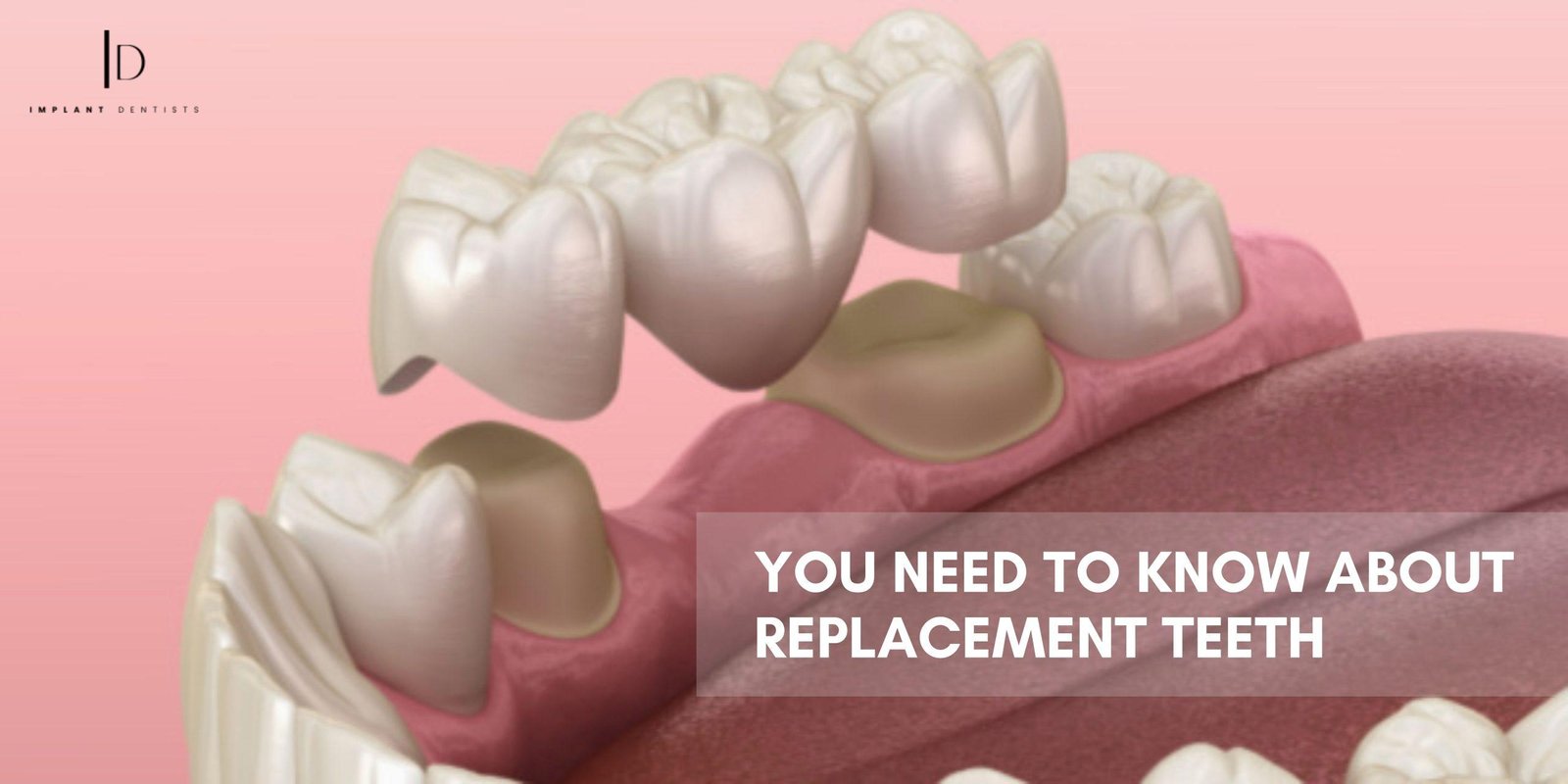
Restoring Your Smile | Everything You Need to Know About Replacement Teeth
February 21, 2024Losing a tooth can be a big deal. It affects not only your appearance but also your ability to eat, speak, and even your self-confidence. Thankfully, modern dentistry offers a variety of options to replace missing teeth and restore your smile to its former glory. Now, we’ll explore the different types of replacement teeth, their pros, and factors to consider when making your decision.
Filling the Gap: Common Types of Replacement Teeth
-
Dental Implants: Considered the gold standard, implants mimic natural teeth the most closely. A small titanium post is surgically placed in your jawbone, acting as an anchor for a crown. Implants are durable, aesthetically pleasing, and function like natural teeth. However, they’re also the most expensive option and require surgery.
-
Dental Bridges: Bridges are fixed restorations that “bridge” the gap left by missing teeth. They consist of artificial teeth attached to crowns cemented onto adjacent healthy teeth. Bridges are strong and natural-looking, but they require preparation of healthy teeth, which may not be ideal for everyone.
-
Dentures: These are removable prosthetics that replace multiple missing teeth. Full dentures cover all teeth in an arch, while partial dentures only fill in specific gaps. Dentures are generally more affordable than implants or bridges, but they may not fit perfectly and can impact speech and eating.
-
Partial Dentures with Implants: Combining implants with dentures offers the best of both worlds. Implants provide stability and prevent bone loss, while the denture fills in the gaps. This option is more expensive than regular dentures but offers superior comfort and function.
Choosing the Right Option: Factors to Consider
- Number of missing teeth: Implants are best for single teeth or multiple spaced apart. Bridges work well for a few consecutive missing teeth. Dentures are suitable for replacing all or most teeth.
- Jawbone health: Implants require sufficient bone mass for placement. Dentures might require bone grafting if bone loss is significant.
- Budget: Implants are the most expensive, followed by bridges, then dentures. Partial dentures with implants are more costly than regular dentures.
- Lifestyle and preferences: Consider your comfort level with removable options, the importance of aesthetics, and your maintenance needs.
5 Pros of Replacing Missing Teeth: Reclaim Your Smile and More!
Losing a tooth isn’t just an aesthetic concern; it impacts your physical and social well-being. Thankfully, modern dentistry offers various solutions to fill the gap and restore your smile’s glory. Beyond regaining that confident grin, here are 5 compelling benefits of replacing missing teeth:
- Eat Like a Champ: Imagine relishing a juicy steak or crunchy apple without struggling. Replacement teeth, especially implants and bridges, mimic natural teeth, allowing you to chew efficiently and enjoy a wider range of delicious foods. Say goodbye to soft diets and rediscover the joy of culinary adventures!
- Speak Clearly and Confidently: Missing teeth can slur your speech, causing self-consciousness and affecting communication. Replacements like dentures or implants improve pronunciation and enunciation, letting you express yourself clearly and confidently in every conversation. Speak your mind without hesitation!
- Boost Your Confidence: A complete smile radiates self-assurance. Replacing missing teeth can drastically improve your self-esteem, empowering you to smile brightly and engage in social interactions without holding back. Let your smile reflect your inner self!
- Protect Your Oral Health: Gaps left by missing teeth create spaces for food debris and bacteria, inviting gum disease and bone loss. Replacements prevent these issues, maintaining the health of your remaining teeth and jawbone. Invest in a healthy smile for the long term!
- Maintain Facial Structure: Missing teeth can cause facial muscles to sag, leading to premature aging and a sunken appearance. Replacements fill the gap, supporting facial tissues and preserving a youthful, healthy look. Age gracefully, not visibly!
Beyond the Basics: Additional Tips
- Consult a dentist: Discussing your individual needs and preferences with a qualified dentist is crucial for choosing the best option.
- Consider long-term implications: While cost might be an initial factor, consider the lifespan and maintenance costs of each option.
- Prioritize oral health: Regular dental checkups and proper oral hygiene are essential for maintaining any type of replacement teeth.
Replacing a missing tooth is a personal decision. By understanding the different options and carefully considering your individual needs, you can restore your smile with confidence and enjoy the benefits of a complete and healthy set of teeth.
Conclusion
Losing a tooth can feel like a loss of confidence and freedom. But fret not! Modern dentistry offers a range of replacement options, each with its own strengths and considerations. This blog served as a compass, guiding you through the different types of replacement teeth, implants, bridges, dentures, and their exciting hybrid – providing an overview of their pros, cons, and suitability based on your unique needs.
Remember, the choice for a replacement tooth is personal. By considering your budget, jawbone health, lifestyle, and aesthetic preferences, you can pave the way for an informed decision alongside your trusted dentist. Don’t let a missing tooth dim your smile – with the right approach, you can reclaim your confidence and rediscover the joy of a complete and healthy set of teeth. So, step out boldly, with a smile that shines brighter than ever!
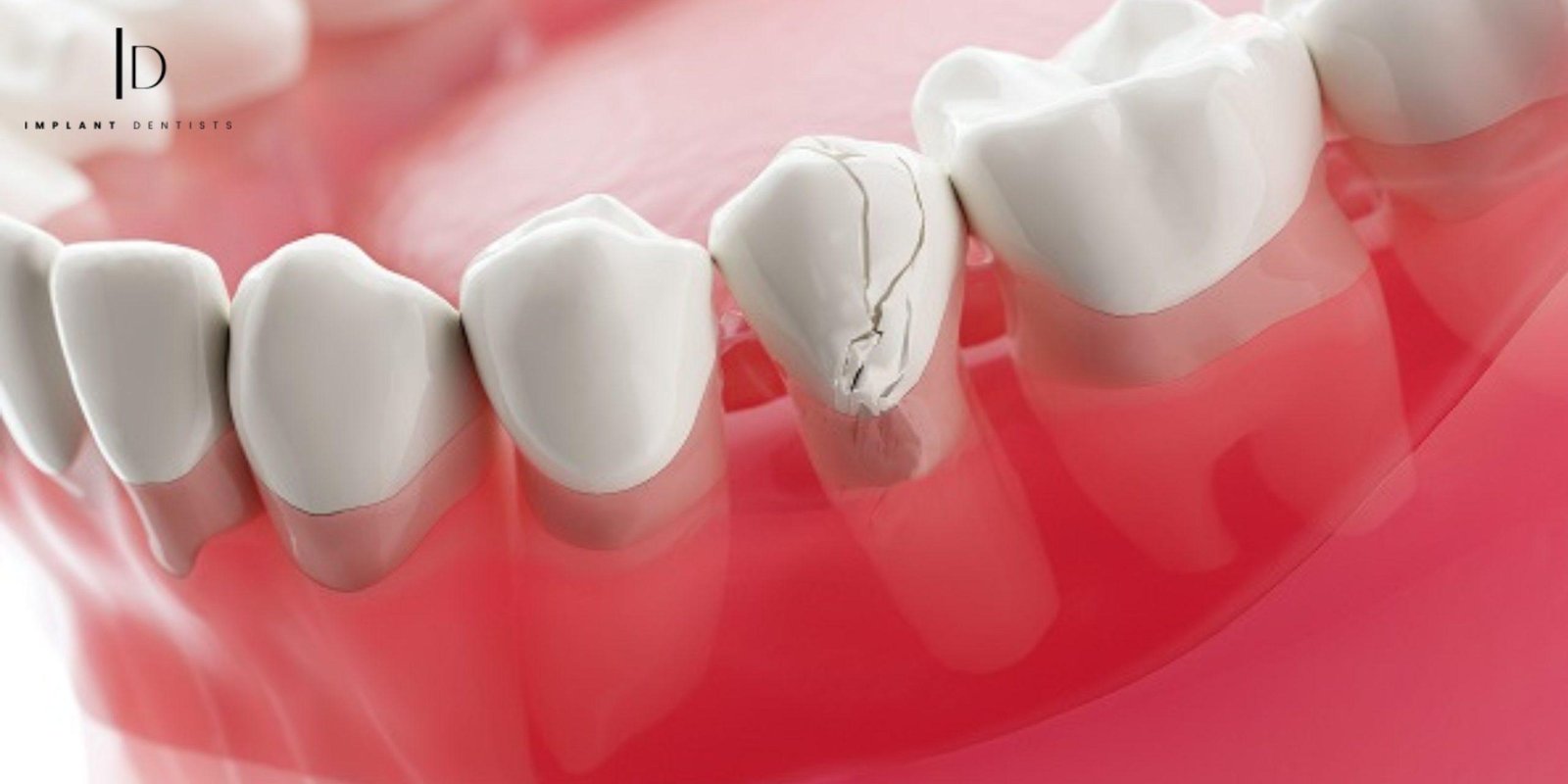
The Complete Guide to Repairing Broken Teeth| Causes, Types, and Treatment Options
February 16, 2024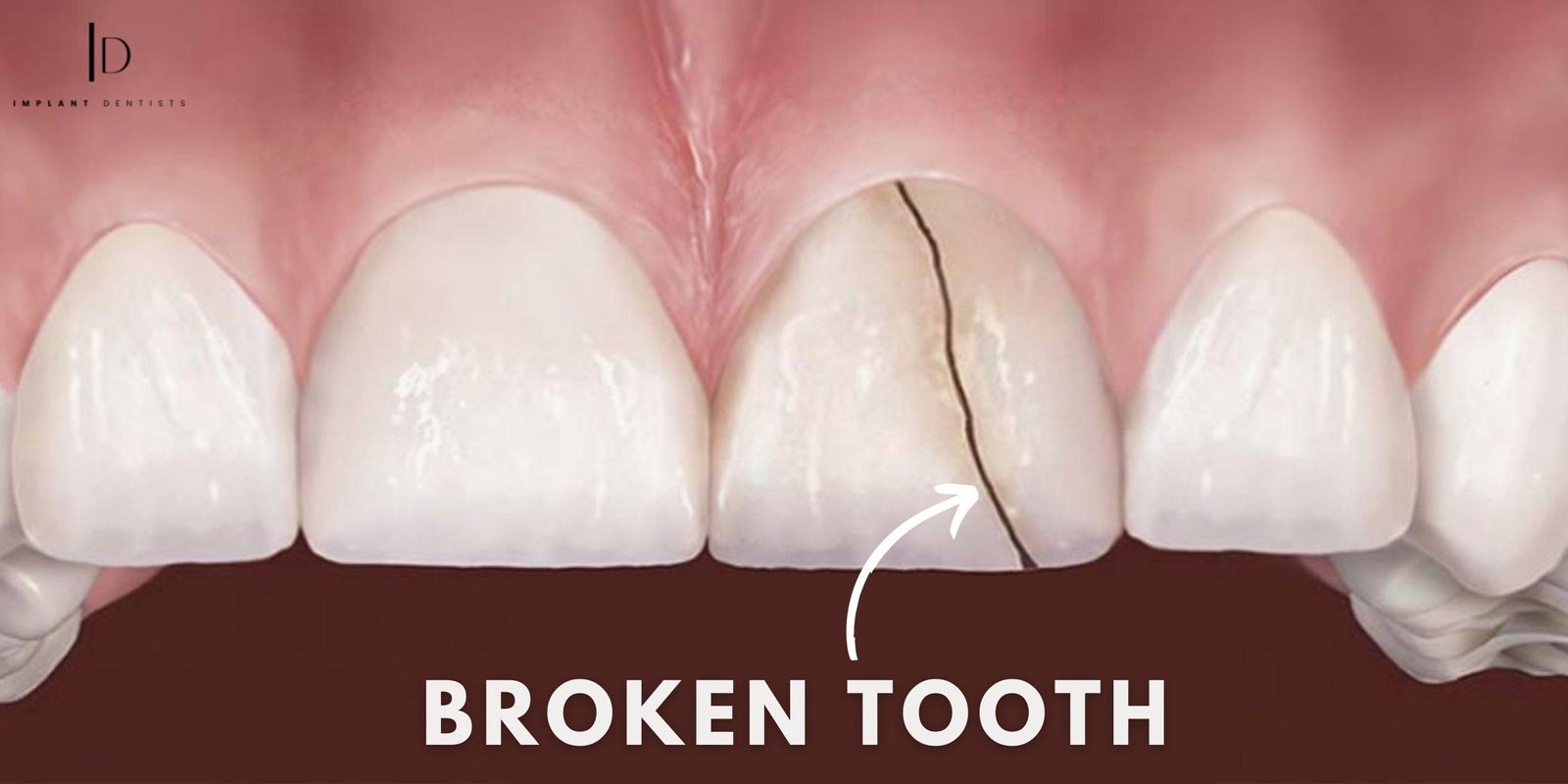
Saving Smiles| Exploring 5 Causes, Treatments & Benefits for Broken Tooth
February 5, 2024A broken tooth can be a worry and painful experience, affecting not just your oral health, but also your confidence in showcasing your smile. Fortunately, advancements in dental care have paved the way for effective broken tooth repair options. Broken tooth repair is a dental procedure designed to restore and renew a damaged or fractured tooth. It brings back functionality to the patient’s smile. Whether the result of an accident, injury, or decay, a broken tooth can cause discomfort, compromise oral health, and impact one’s confidence. Now, we’ll explore the causes of a broken tooth, available treatments, and the benefits of seeking prompt repair.
Causes of Broken Tooth
- Trauma or Injury: Accidents, falls, or sports related injuries can cause direct impact to the mouth, leading to a broken tooth. This can happen during activities like playing sports, falling, or any other situation where the mouth experiences forceful contact.
- Biting on Hard Objects: Chewing on hard substances such as ice, unpopped popcorn kernels, or non food items can lead to tooth breakage. The excessive force applied while biting down on hard objects can cause teeth to fracture or chip.
- Untreated Tooth Decay: Prolonged tooth decay weakens the structure of the tooth, making it more susceptible to breakage. When cavities are left untreated, they can progress and compromise the unity of the tooth, eventually causing it to break.
- Bruxism (Teeth Grinding): Regular teeth grinding, known as bruxism, can apply significant pressure on the teeth, leading to wear and tear. Over time, this constant grinding can weaken the coating and result in fractures or breaks in the teeth.
- Large Fillings or Weak Tooth Structure: Teeth with large fillings or those that have undergone extensive dental work may be more prone to breakage. The presence of a large filling can compromise the structural integrity of the tooth. If the filling is old or poorly done, the tooth becomes more susceptible to fractures.
Five Potential Treatments for a Broken Tooth
- Dental Bonding: Dental bonding is a common treatment for minor tooth fractures. It is often used for fractures caused by trauma or biting on hard objects. In this procedure, a tooth coloured resin is applied to the damaged tooth and then shaped and polished to restore its appearance and function.
- Fillings: If the broken tooth is a result of untreated tooth decay, a dental filling may be used to repair the damage. The decayed portion of the tooth is removed. A filling material is used to fill the cavity and restore the tooth’s structure.
- Dental Crowns: For more extensive tooth damage, such as a large fracture or a weakened tooth structure, a dental crown may be recommended. A dental crown is a custom made cap that covers the entire tooth, providing strength, protection, and restoring its appearance.
- Night Guards for Bruxism: If teeth grinding is the cause of the broken tooth, a dentist may recommend the use of a custom fitted night guard. This oral device is worn while sleeping to cushion the impact of grinding. It prevents further damage to the teeth.
- Root Canal Treatment: In cases where a broken tooth extends into the pulp, a root canal may be necessary. This involves removing the damaged pulp, cleaning and disinfecting the root canal, and then sealing it to prevent infection. After a root canal, a crown is often placed to strengthen and protect the tooth.
Benefits about Broken Tooth Treatment
- Improved Oral Health: Seeking timely broken tooth repair not only relieves pain but also contributes to overall oral health. Addressing fractures prevents the risk of infections and decay that may arise from exposed tooth pulp.
- Enhanced Aesthetics: Dental repairs, such as bonding, crowns, or veneers, go beyond functional benefits. They restore the natural appearance of the tooth. This boosts your confidence and allows you to smile freely without concerns about visible damage.
- Long-term Cost Savings: Investing in broken tooth repair can save you money in the long run. Addressing the issue promptly helps prevent further complications that may require more extensive and expensive dental procedures in the future.
- Restored Functionality: Repairing a broken tooth ensures that you can comfortably chew and eat without discomfort. This restoration of functionality is essential for proper digestion and overall well-being.
- Preservation of Natural Teeth: Certain treatments, like dental bonding and crowns, aim to preserve the natural structure of the tooth. This is advantageous compared to extraction, as it helps maintain the integrity of your natural teeth for as long as possible.
- Boosted Confidence: A healthy, well-maintained smile can significantly impact your self-esteem. By addressing a broken tooth promptly, you improve the physical aspects of your smile. You enhance your mental well-being by feeling more confident and comfortable in social situations. Address a broken tooth promptly to maintain this feeling.
- Customized Solutions: Dental professionals offer a range of repair options tailored to your specific needs. Whether it’s a minor chip or a more extensive fracture, there are personalized solutions that cater to the severity of the damage, ensuring optimal results.
Conclusion
In the journey to broken tooth repair, recognizing the causes is key. Understanding the signs and embracing the available treatment options are also important. Whether your tooth has suffered a minor chip or requires a more extensive restoration, the benefits of timely repair extend beyond pain relief. By promptly addressing a broken tooth, you not only alleviate discomfort but also prevent further damage, ensuring the longevity of your oral health. The array of treatment options, from dental bonding to implants, allows for personalized solutions tailored to your unique situation. Our dedicated dental care team is committed to delivering personalized and effective treatment for broken teeth. They help you regain confidence in your oral health with compassionate care.
